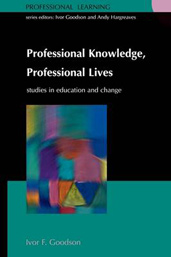Professional Knowledge, Professional Lives: studies in education and change
Educational Research as a Public Intellectual
Applied research however aimed to evacuate foundational theory to immerse itself in the realities of classroom life. In the process however, the capacity of foundational and disciplinary theory to address broad questions about the historical, sociological and philosophical definition of schooling was potentially lost. Under benign governance, believing in good intentions - classrooms, compassionate and would-be democratic micro-worlds - these were the places to be and in which to conduct and generate applied research. What was lost in a welter of good intentions was the public intellectual handle on questions of the social position of schooling, the ideological content, the grammar, the social epistemology, the social and political place and purpose of schooling. Applied research in classrooms is fine when classrooms are progressing, becoming more inclusive, more democratic places. But when the tide turned applied research suffered from extreme discourse deficit. The focus on application on classrooms left educational research a victim of those who could re-define applications and classrooms. Applied research was left with too few levers to look at the overarching questions once explored albeit patchily in foundational theory.
Moreover, the applied research movement by aiding in the dissolution and deconstruction of foundational theory helped soften up the context for a wholly different ideological coup of the sort MacDonald refers to. By focussing back to practice especially to classroom practices, the doors were open to a new more utilitarian doctrine of teacher education and educational research. Teaching and schooling now could be presented as practical matters beyond broad intellectual contestation. And if teaching in a practical matter then changing schooling is a matter of technical fine tuning and education research is only there to service the technical adjustments that will deliver effective schools.
The paradox of progressivism in the era of 1970s CARE is that by helping dismantle the liberal settlement of foundational and disciplinary theory to move towards a more engaged and practical applied research mode, a wholly different ideological coup was facilitated. By 1980 the forces that had long contested empowering education for all were in control and their desire to extinguish educational theory which engaged questions of the nature and purposes of schooling was evident. For them all arguments for applied and practical research aided in obscuring the larger question of social purpose and social allocation. Progressive arguments were hi-jacked, inverted and used for a wholly indifferent social project with diametrically opposed purposes.
Now in case this sounds too glib, which it does and too critical of applied research, I should note that it is symptomatic of the broad based paradox of progressivism in this period, of a crisis of positionality not of ones own making and which could not have been fully foreseen. Certainly I don't want to risk self-abuse in this lecture but I should note that much of my own work on school knowledge falls fairly and squarely into the positional trap I have defined as do most other progressive modalities and practices conceived of in the 30 years since 1945. To say this is to confirm the extent of the task of reconceptualisation and repositioning that stands before us. But there is a final paradox - whilst flawed and whilst ultimately enmeshed in the positional trap defined above the work of groups like CARE still provides the kind of collective memory and sets of working definitions and practices which will be invaluable in rebuilding new projects which aim at social justice and social enlightenment. As always in social change, we have to pick ourselves up and begin again. This time a little wiser, less believing in governmental and global good intentions, and more cognisant of the need for ‘theories of evil’, as we pursue our purposes.
